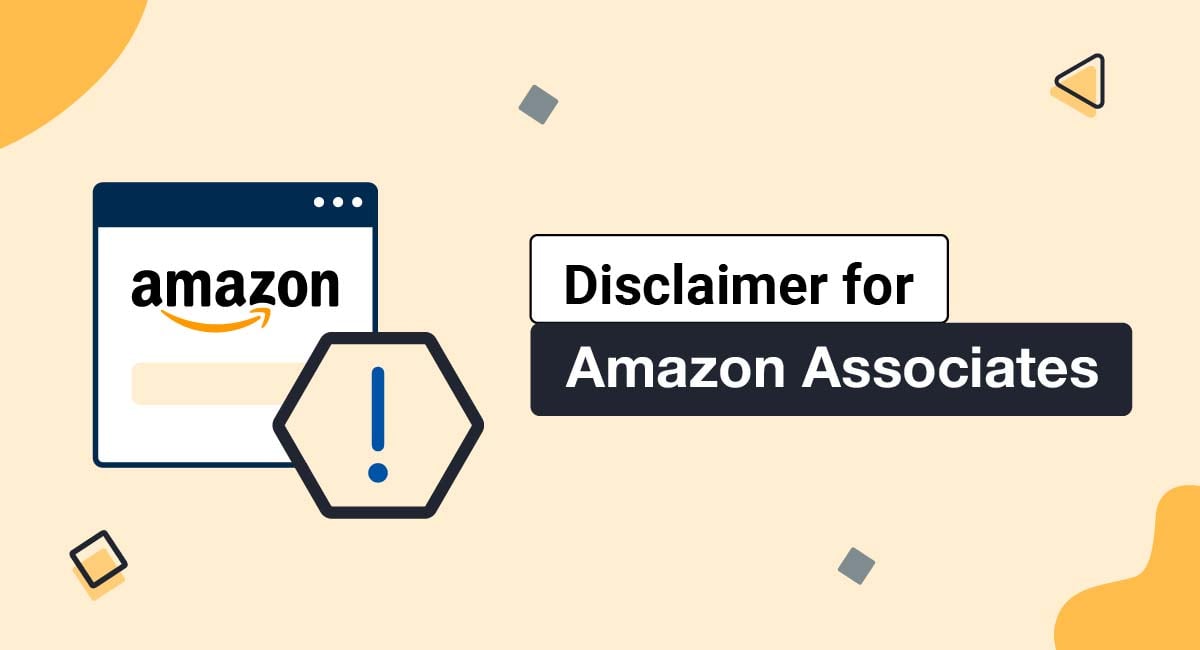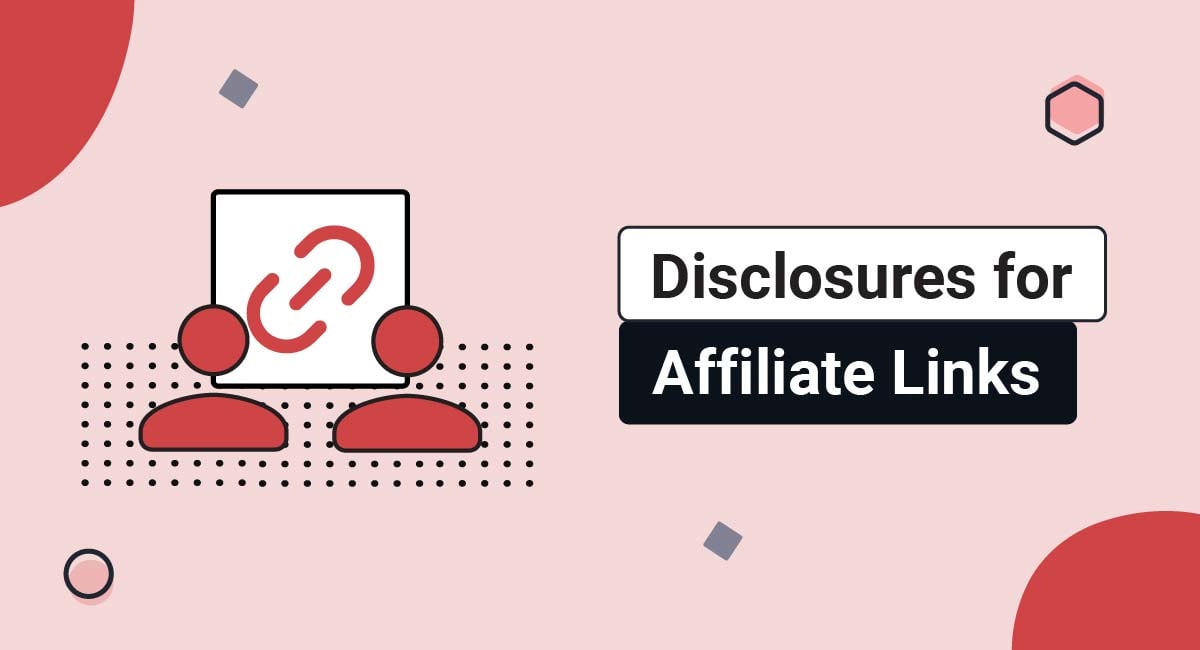If you are a business owner or blogger who is using or planning on using Amazon Associates, you need a disclaimer or a disclosure informing users about your use of Amazon Associates.
You likely also need other legal agreements as well.
This article will help explain why, as well as provide examples of how other business owners and blogs are successfully using disclaimers and disclosures relating to their use of Amazon Associates program so you can successfully create and display your own.
Our Disclaimer Generator can generate a legal disclaimer for your business, website or mobile app. Just follow these steps:
-
At Step 1, select where your Disclaimer will be used.
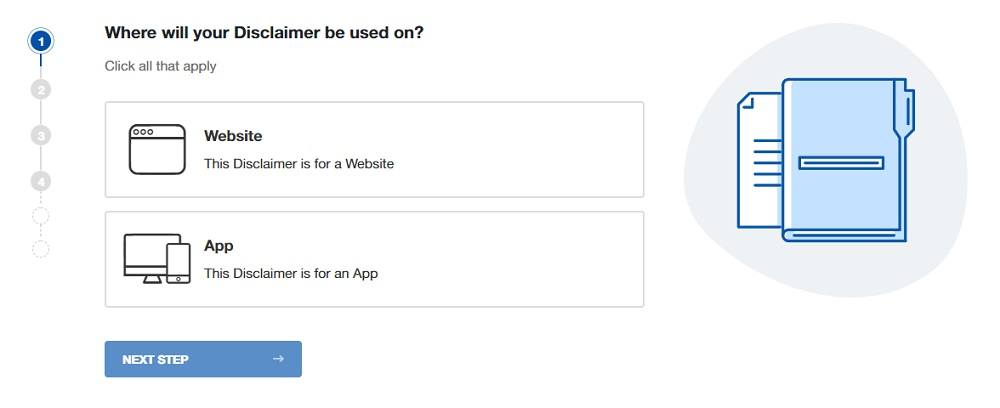
-
At Step 2, add in information about your website/app and business.
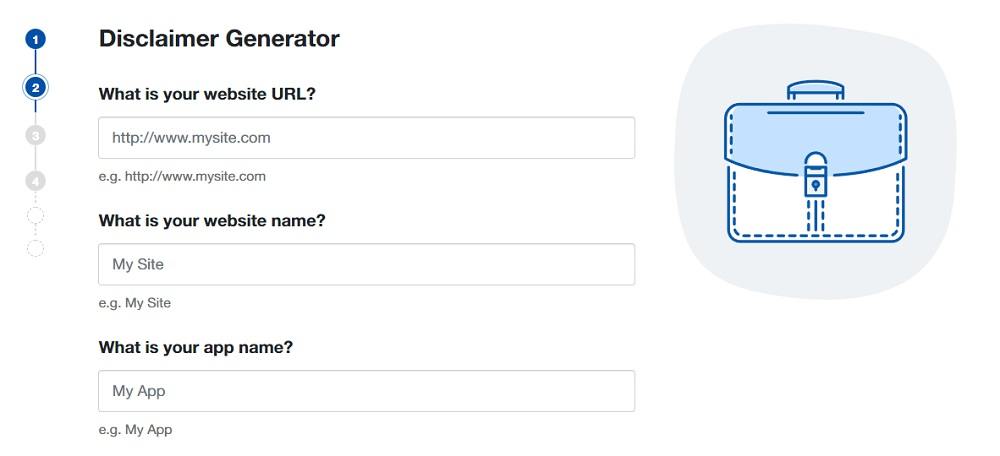
-
Answer some questions about your business practices.
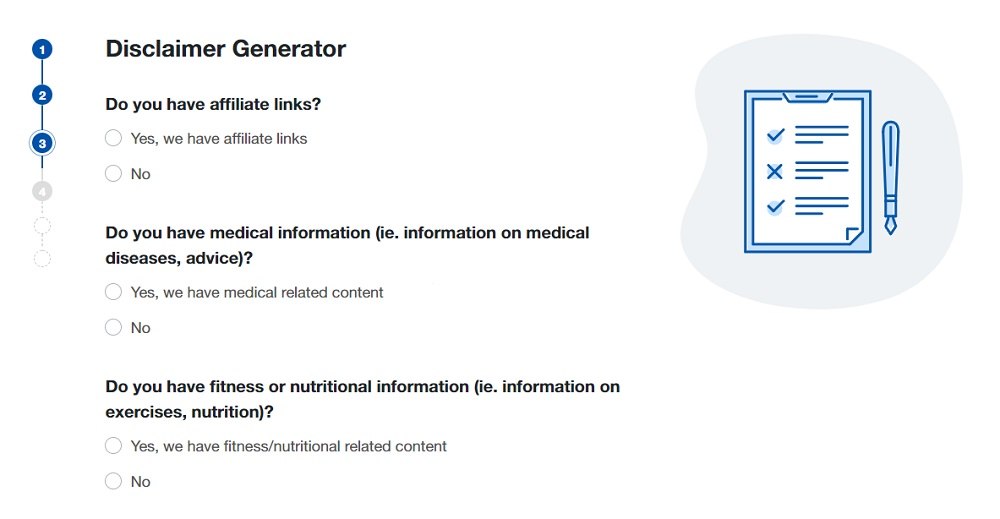
-
Enter an email address where you'd like to receive your Disclaimer and click "Generate."
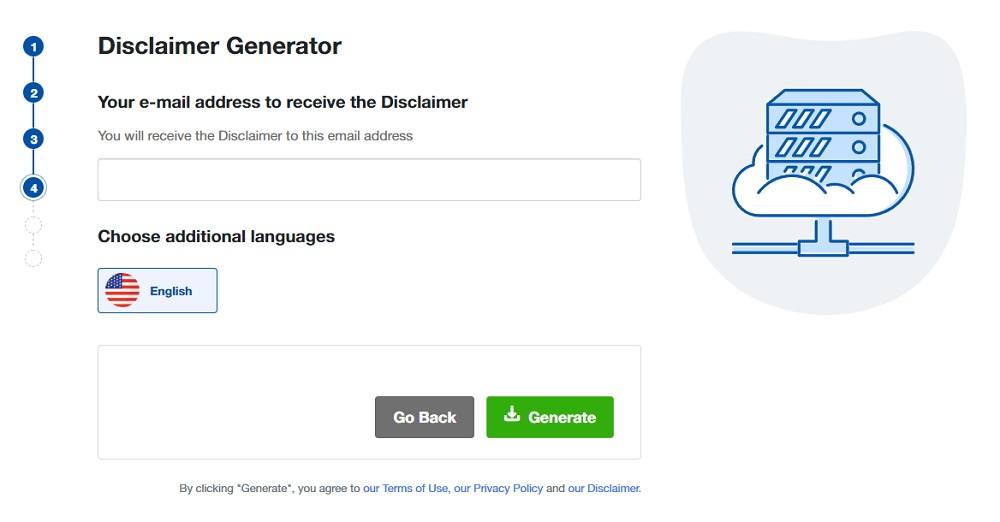
Done! You'll be able to instantly access and download your new Disclaimer.
What is Amazon Associates?
Amazon Associates is an online affiliate marketing program that allows business owners and bloggers to earn referral fees by placing links to products for sale on Amazon on their own separate websites.
Bloggers (or any online businesses) who advertise or write about certain products can place links on their websites for these products from Amazon. Users then click on those links to buy the products from Amazon, generating a referral fee for the blogger whose link the user clicked on.
It's the classic affiliate marketing program with referral links.
What is Required by Amazon and Privacy Laws?

You need both a Privacy Policy and a disclaimer disclosing your use of Amazon referral links if:
- You collect personal information from users, e.g. web forms, email newsletters etc.
- You use Amazon Associates for your affiliate marketing
Privacy laws trigger the Privacy Policy requirement, while Amazon's Operating Agreement requires the disclaimer if you are part of its affiliate program.
Amazon does not explicitly and specficially require you to have a Privacy Policy. There is also no mention of a Terms & Conditions agreement requirement. However, you will legally be required to have a Privacy Policy if you collect personal information.
When it comes to the requirement of a disclaimer, Section 5 of the Associates Program Operating Agreement is called "Identifying Yourself as an Associate" and it requires that everyone who signed-up to be an Amazon Associate must identify as an associate:
"You must clearly and prominently state the following, or any substantially similar statement previously allowed under this Agreement, on your Site or any other location where Amazon may authorize your display or other use of Program Content: "As an Amazon Associate I earn from qualifying purchases."
Here's how it looks:

As an example of a relevant privacy law, the California Online Privacy Protection Act (CalOPPA) dictates that you need to include a Privacy Policy on your website if you collect any personal data form users. Personal data can be any of the following (Note that this list is not all-inclusive and there are many other types of information that are considered to be personal data under privacy laws):
- Email addresses
- Shipping addresses
- Last names
- IP addresses
- Birthdates
- And so on
However, if your website does not collect any personal data from users, but you do use affiliate links for Amazon products, then you only need a disclaimer.
Disclaimer Guidelines by the FTC

The Federal Trade Commission (FTC) has provided the "Endorsement Guide" document that addresses a number of social media advertising and marketing best practices and requirements, including the requirement that there must be disclaimer made available when affiliate links are used on a website.
When people are reading a blog that recommends a product, people are placing their trust in that website to steer them to a good, quality product. If the owner or operator of that website is making money from people who purchase the product via her/his site, this is something that most people would want to know about.
Not disclosing affiliate marketing links can be misleading to the visitors of your website. Without a disclosure, these visitors may think that you really just recommend that product because it's great. While this may be the case, knowing that you are making money on each purchase gives your visitors information to consider before making the purchase based on your recommendation.
You can download this set of instructions how to create a disclaimer for Amazon Associates.
This kind of disclaimer must disclose your relationship to Amazon, and be written clearly and conspicuously, and be placed prominently and conspicuously.
Not everyone knows what an "affiliate link" or "affiliate program" is. Simply saying something like, "This link is an affiliate link" is not clear and conspicuous enough. Provide more information about what the link is for, and what happens when a user clicks on this kind of link.
It's acceptable to say something as simple as "I make a commission for purchases made through the following link."
It's not adequate to bury the information disclosing your affiliate link on a random web page, such as an "About Us" page or "Information" page, nor should that kind of disclaimer be placed at the bottom of your web pages where users may never scroll down to.
It needs to be visible.
The disclosing information must be placed close to the affiliate link itself in such a way that by the time the user would be able to notice and click on the link, she can also easily notice and read or click on a link to read your disclaimer.
Place the disclosing information right before or next to the affiliate link for maximum effectiveness. The below example is taken from the FTC's Endorsement Guide, linked above:
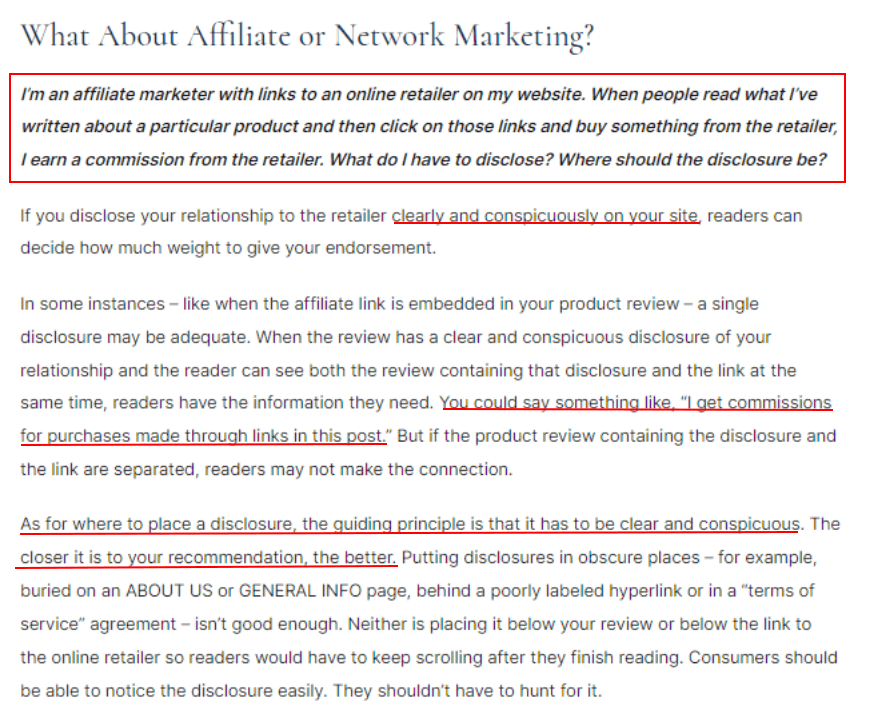
Examples of Affiliate Disclaimers for Amazon Associates

The disclaimer you plan to draft and use should make it very clear that you are being compensated when a user clicks on one of your affiliate links.
Use clear, concise language, and conspicuous, prominent placement.
Au Naturale Nutrition has a disclosure section in the footer that's visible on every single page of the website. The section disclosing information related to affiliates links states that:
Any/all of the links on AuNaturalNutrition.com are affiliate links from with I receive a small commission from sales of certain items. As an Amazon Associate, I earn from qualifying purchses. Thank you!
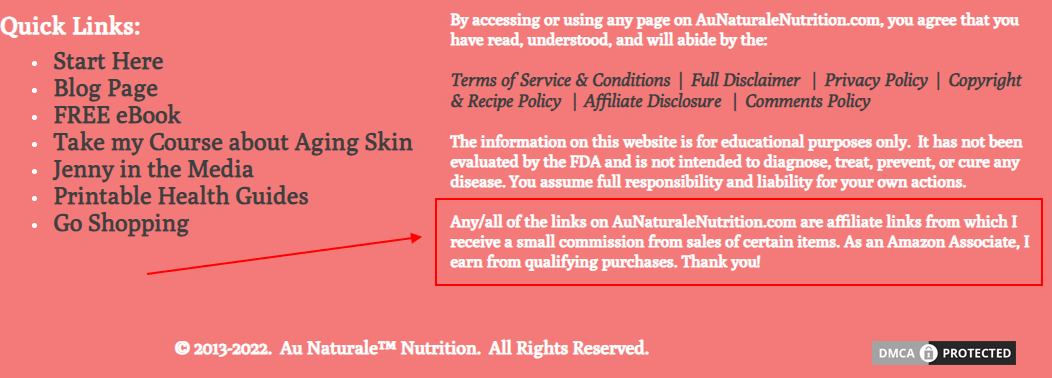
This section is also linked to the Disclosure page that thoroughly describes what an affiliate link is, why this disclosure is being made, and a thorough list of each company where affiliate links are used.
By including relevant information in the footer of every web page with a link to a more thorough page on this information, Au Naturale Nutrition is making sure that users visiting the web site will notice the disclaimer information.
This screenshot from Au Naturale Nutrition shows the section that mentions the use of Amazon Affiliate links. It's very detailed and informative for users who may not know how affiliate links work:
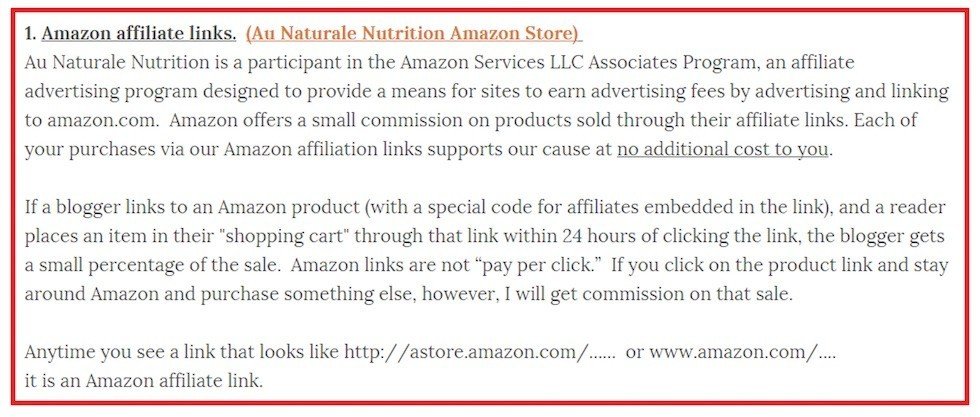
You need to make sure to disclose all forms of compensation to your users, whether you were given monetary compensation, free products, or other compensatory perks for writing an article, or a review, or providing a service, and so on.
Below is an example of a disclaimer that Mom Does Reviews used to place prominently on each of the reviews:

It has since changed its disclaimer to be smaller, but more detailed with specific information:

If you write an ad for a product that you will be financially compensated for, you must disclose this.
For example, say you create a tweet that promotes a product and includes an affiliate link where users can purchase the product and this will generate a commission for you.
You must include a hashtag or disclaimer in the Tweet that you are advertising. Including a #ad will be a sufficient disclaimer. The same goes for other social media outlets such as Facebook and Instagram:

Summary
If you're earning money through Amazon Associates and you're using affiliate links on your blog, mobile app, make sure that a disclaimer is available on your website and visible at all time.
Place it as close to the affiliate links as possible, or at least in a conspicuous place, such as at the very beginning of the post where readers will come across affiliate links. Placing the disclaimer at the end of a blog post with affiliate links won't work, since people may end up clicking on one of your affiliate links before reading to the end and noticing the disclaimer.
A great way to display your affiliate disclaimer is in your website footer. If you need more room for more text, you can place a summary of the disclaimer in your website footer and then link to a separate disclaimer page with the additional information.
Don't forget to include a Privacy Policy to adhere to global privacy laws if your affiliate-linked website or blog also collects protected personal information.

Comprehensive compliance starts with a Privacy Policy.
Comply with the law with our agreements, policies, and consent banners. Everything is included.
